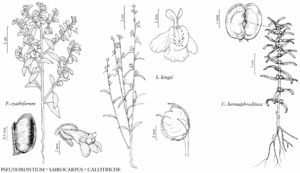Difference between revisions of "Pseudorontium cyathiferum"
Feddes Repert. Spec. Nov. Regni Veg. 52: 33. 1943.
imported>Volume Importer |
imported>Volume Importer |
||
| Line 61: | Line 61: | ||
|publication year=1943 | |publication year=1943 | ||
|special status=Illustrated | |special status=Illustrated | ||
| − | |source xml=https:// | + | |source xml=https://bitbucket.org/aafc-mbb/fna-data-curation/src/2e0870ddd59836b60bcf96646a41e87ea5a5943a/coarse_grained_fna_xml/V17/V17_134.xml |
|genus=Pseudorontium | |genus=Pseudorontium | ||
|species=Pseudorontium cyathiferum | |species=Pseudorontium cyathiferum | ||
Latest revision as of 19:30, 5 November 2020
Stems 15–35(–70) cm. Leaves: petiole 4–15 mm; blade ovate to broadly ovate, 30–40 × 20–25 mm, smaller distally. Pedicels 1–3 mm, longer in fruit, glandular-hairy. Flowers: calyx lobes equal, 4–5 mm in flower, 6.5–9 mm in fruit, glandular-hairy; corolla 8–10 mm, abaxial lip cream, often with darker veins, palate white with yellow spots, furrowed, adaxial lip cream with deep purple veins; staminode 0–1 mm. Capsules pendent, globular, 5–8 mm, sparsely glandular-hairy. Seeds 1.5–2.5 mm, ridged and tuberculate dorsally, winged adaxially. 2n = 26.
Phenology: Flowering Jan–Apr.
Habitat: Rocky slopes, washes.
Elevation: 0–800 m.
Distribution
Ariz., Calif., Mexico (Baja California, Sonora).
Discussion
Plants of Pseudorontium cyathiferum will flower and set fruit at any time of the year if moisture is available. Sand grains often stick to the viscid hairs, covering the plants.
Selected References
None.
